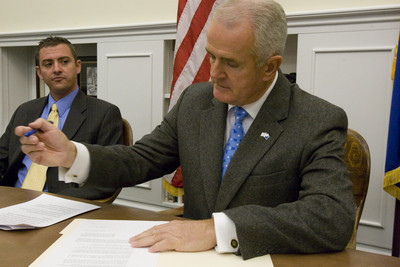Gibbons: Deal reached


CARSON CITY — Gov. Jim Gibbons said Friday he has reached an agreement with legislative leaders on a bipartisan plan to handle state government’s $341.7 million budget deficit without laying off workers or cutting essential services.
"This will have a minimal impact on state services," Gibbons said about their plan designed to balance the budget in the fiscal year that ends June 30.
"This is an extraordinary economic recession for the state of Nevada. Extraordinary times require extraordinary measures," he said after calling a special session of the Legislature for Monday and Tuesday.
The Nevada Constitution requires balanced state budgets.
The bailout plan consists of:
• Taking a $160 million letter of credit from the Nevada Local Government Investment Pool. The money would be borrowed only if necessary in the spring.
• Taking $76.7 million from reserves in budgets of non-general fund agencies. Officials said this action would not affect their operations
• Making $72.8 million in budget cuts to about two dozen state agencies. The amount of cuts would vary from agency to agency.
• Securing a $28 million advance payment in net proceeds of mineral taxes from mining companies. The companies have agreed to the advance payments.
• Securing $3 million in additional tax collections that were not specified.
The governor pointed out the plan does not include tax increases and reiterated that he would veto any bills increasing taxes.
"I am trying to keep people in their homes and in their jobs," Gibbons said. "I am not in a taxing mood. I would much rather cut spending than raise taxes."
Assembly Minority Leader Heidi Gansert, R-Reno, agrees with the "direction" of the bailout plan, but wants to see the actual legislation before giving total support.
"I don’t think we will have yes votes from everyone," she said.
"We have a deal that gets us through the immediate crisis," added Assemblywoman Sheila Leslie, D-Reno. "It doesn’t mean there won’t be bumps (Monday), but it will pass. It is our duty to balance the budget."
Leslie even predicted that the process next week will go more smoothly than during a 12-hour special session on June 27.
Senate Taxation Chairman Bob Coffin, D-Las Vegas, said he has not been briefed on the plan by Senate Majority Leader Steven Horsford, D-Las Vegas.
Horsford plans to meet with his members on Sunday, as will Gansert and Assembly Speaker Barbara Buckley, D-Las Vegas.
"All I know is what I see in the press," Coffin added. "I don’t know enough yet to say I will support it."
Although the governor said there will be no layoffs, the plan calls for $72.8 million in unspecified state agency budget cuts.
Gibbons would not say where these cuts will occur. He said legislative leaders first must present the agreement to their members.
His budget director, Andrew Clinger, said the cuts vary from agency to agency and include a small cut in educational spending.
Clinger said no teachers will be laid off during the current fiscal year, but he would not promise that there were be no teacher layoffs during the next fiscal year that begins in July.
According to a source, many of the cuts will come in the Health and Human Services Department, which provides welfare, Medicaid, mental health, foster parent, senior drug and other programs.
Because the agreement has bipartisan support, the governor hopes legislators can meet, pass legislation needed to make the budget changes and adjourn Monday.
The proclamation calling the Legislature into special session allows them to meet through Tuesday. The governor, however, could extend the special session if necessary.
Since the beginning of the year, Gibbons and legislators already have cut state spending by nearly $1.2 billion. Nevada operates under a $6.8 billion, two-year budget.
Because tax revenues are expected to continue to decline, the Economic Forum determined Monday that the state will have $5.65 billion to spend in the next two-year budget, or $1.2 billion less than the current budget.
But action on that shortfall will not come before the beginning of the regular legislative session on Feb. 2. The special session will deal only with the shortfall during the remaining six months of the current fiscal year.
If the budget deficit increases during the remainder of the fiscal year, Clinger said the administration has no additional reserves from which it could secure money.
"We are out of solutions at this point," he said.
Contact Capital Bureau Chief Ed Vogel at evogel@reviewjournal.com or 775-687-3901.
ON THE WEB View the slideshow











